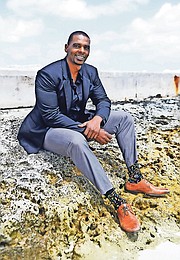Health coach Ethan Quant, of Elite Wellness Solutions, has succeeded in his weight loss journey and now wants to share his methods with the Bahamas in an effort to foster a culture of wellness and conquer the obesity epidemic.
In our new approach to combatting obesity in the Bahamas, the most important quality that health, wellness and fitness professionals can exhibit to persons suffering from this deadly disease is empathy.
While I appreciate that this does not apply to all health, wellness and fitness professionals, it has been my personal experience on the road to transforming my body and overcoming obesity that the vast majority of industry professionals have low expressions of empathy when working with the overweight and obese population.
Empathy is one of four domains of emotional intelligence. Emotional intelligence is the capacity to be aware of, control and express one’s emotions, and to handle relationships empathetically and without judgement.
Within the context of behavioural change, there are three main types of empathy. They are as follows:
Cognitive empathy is understanding how the person thinks about the situation. You understand their mental models. This helps the health wellness and fitness professionals to be adept communicators because they are better equipped to speak to clients in ways that resonate and are more easily understood.
Emotional empathy is connecting with the client on exactly what they are feeling. This can help you and your client to remain engaged throughout periods of difficulty. It can be particularly beneficial when you are able to sense when the client is going through an emotional low point. Whatever it is, health and fitness professionals need to be aware so that they can sense these feelings in the moment. Doing so can be the difference maker in allowing you to manage those feelings effectively and being able to transform what could have been something negative it into a benefit for the client. Most importantly, it also cultivates a level of trust between you and the client.
Empathic concern requires that industry professionals motivate their clients. This type of empathy dictates that whatever is going on with the individual in their thoughts and their feelings, you also understand what they need in the moment and what it is that you can do to help them. You have to be there for them as a motivator and pillar of support that allows you to remain a positive contributor to helping clients through gruelling periods in their journey to becoming healthier and happier. Once their well-being is paramount, half the battle is already won.
Uniquely, I know that because I was once obese, it is much easier for me to empathise with clients in a similar battle. I know what it feels like to be obese, not just physically, but I felt the toll of my physical struggles mentally and emotionally as well. However, as health and fitness professionals we have made the decision to help people who are struggling with their unhealthy behaviours. This means that we have to meet the clients where they are and move them at their pace towards their goals. An important part of this process is maintaining a positive disposition for us and for the clients. We want to keep them positively focused and help them to visualise how awesome it will feel to accomplish their goals.
This doesn’t mean that we can’t challenge them. Nevertheless, we want to do so in a way that sets them up for success, not failure. This may require reassessing initial goals or redesigning their programme. Whatever the case may be, we have a responsibility to our clients to not just keep them on their journey, but to do our best to ensure that it is a positive experience as well.





Comments
Use the comment form below to begin a discussion about this content.
Sign in to comment
OpenID